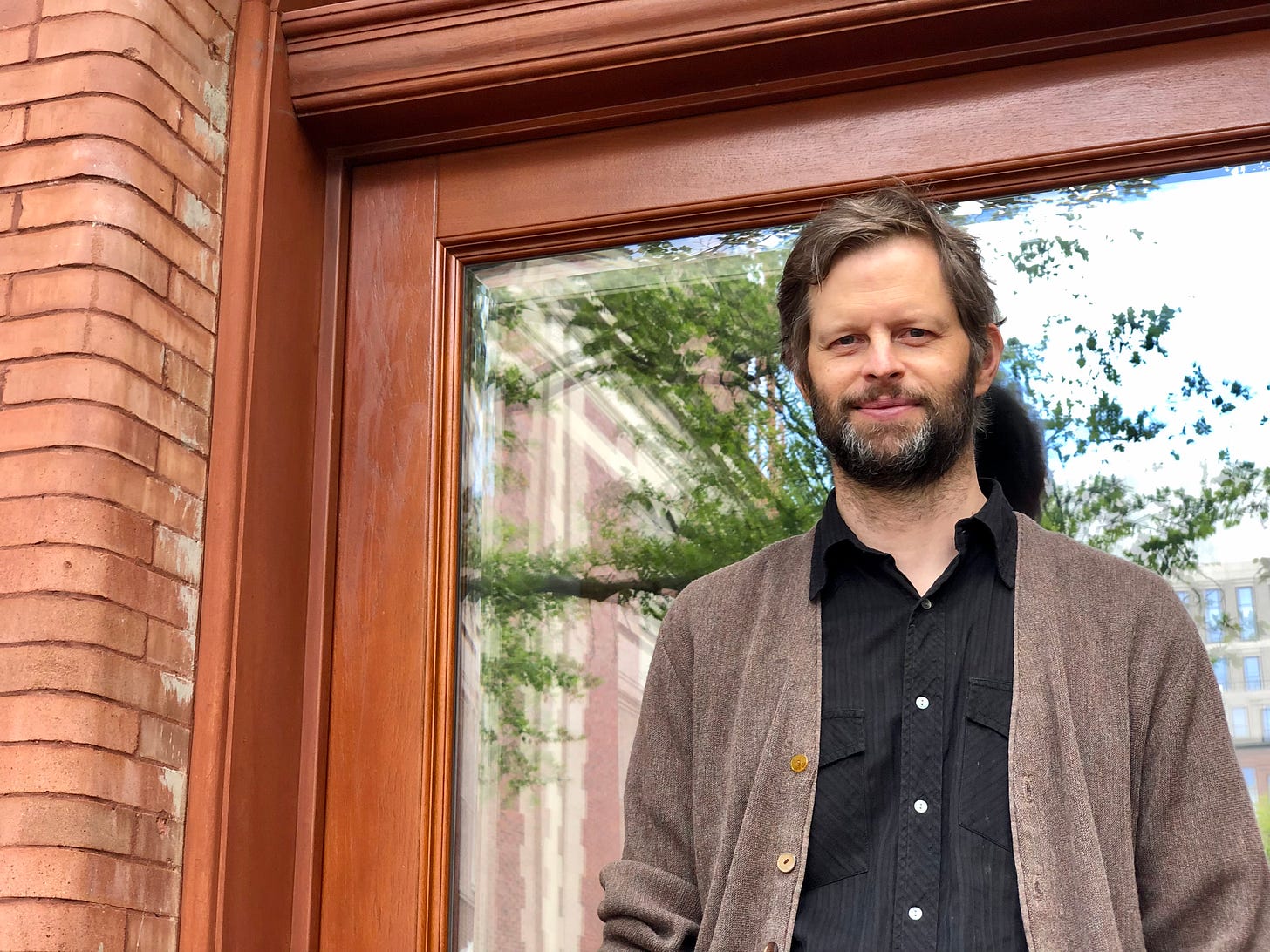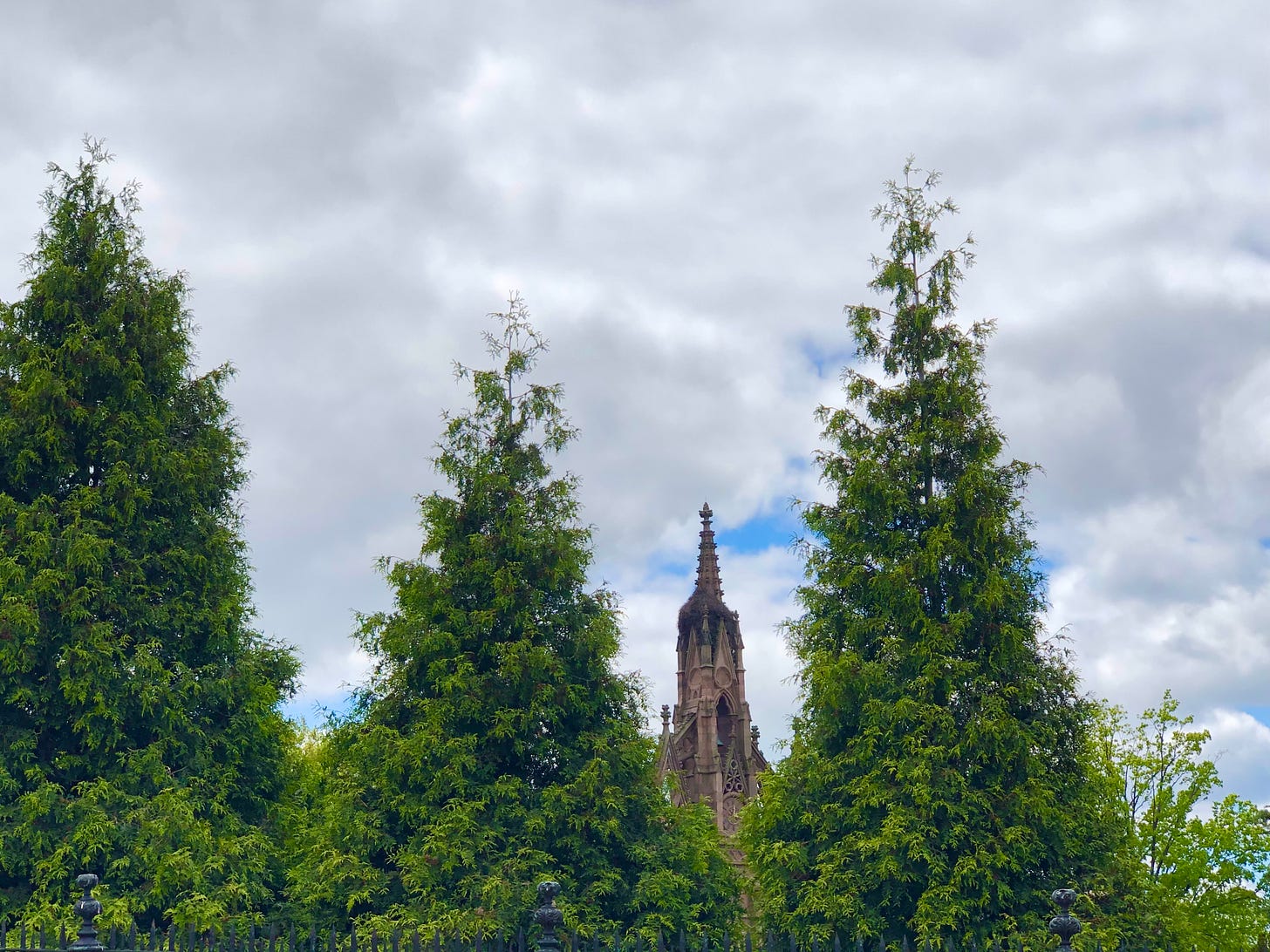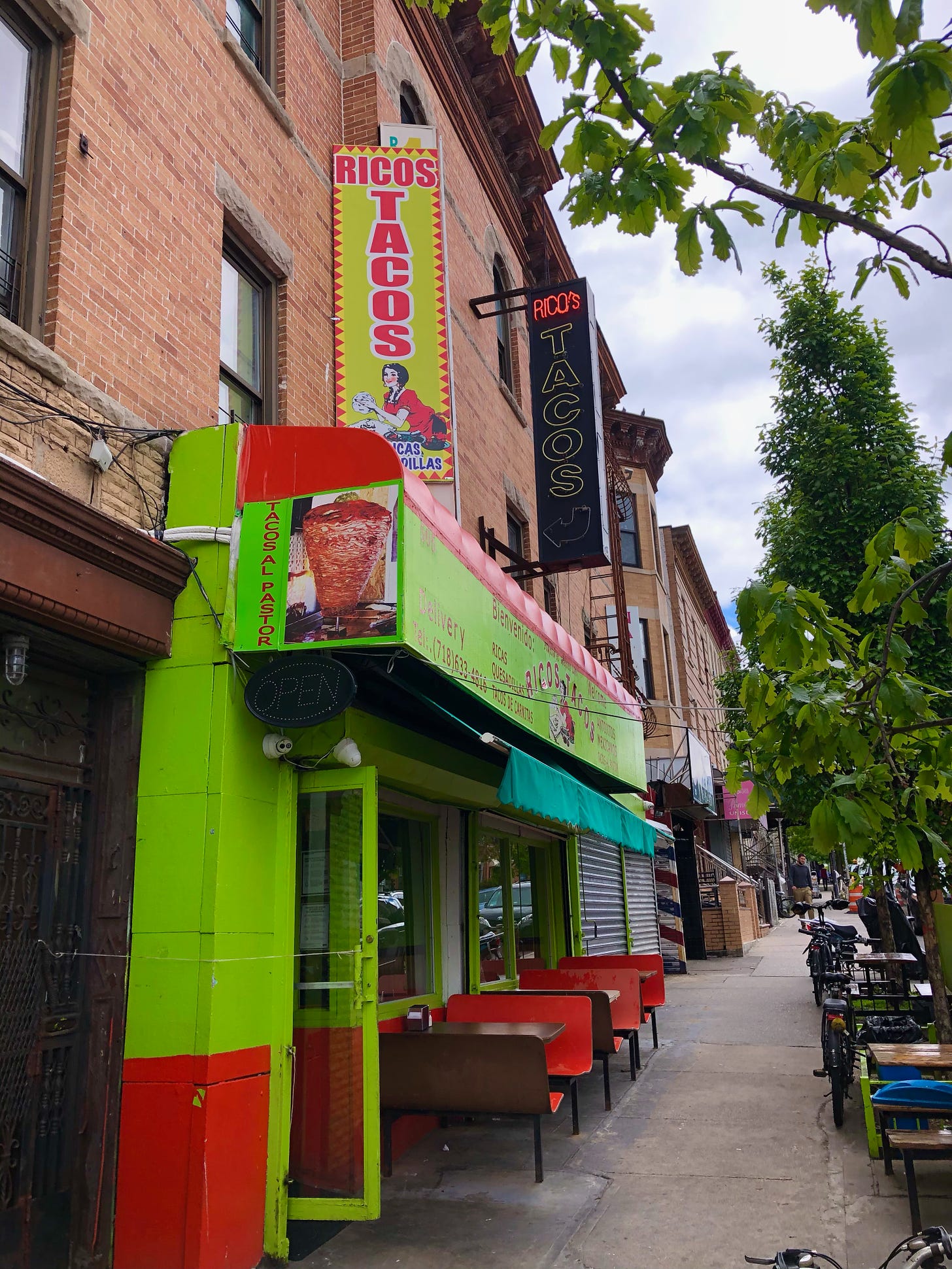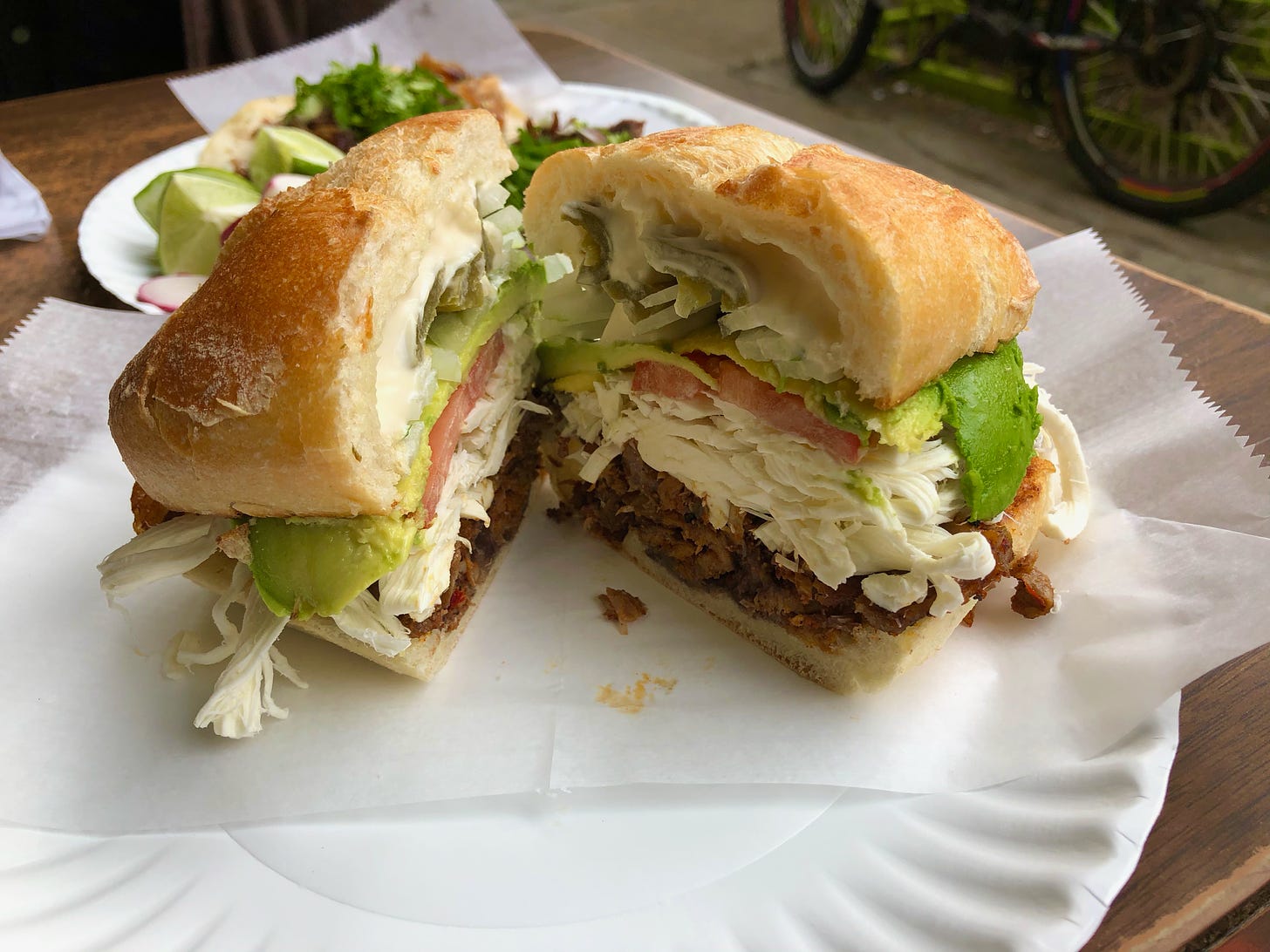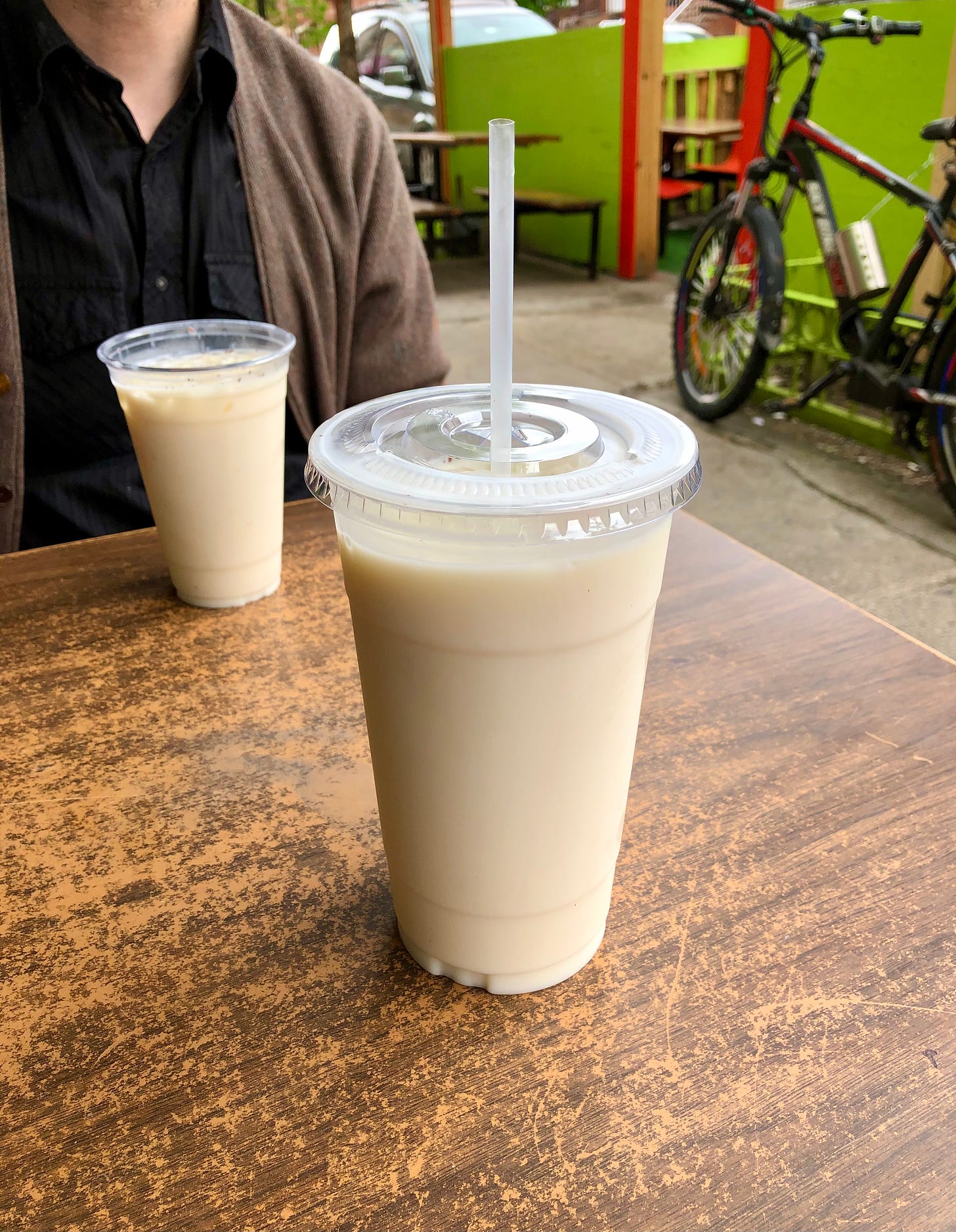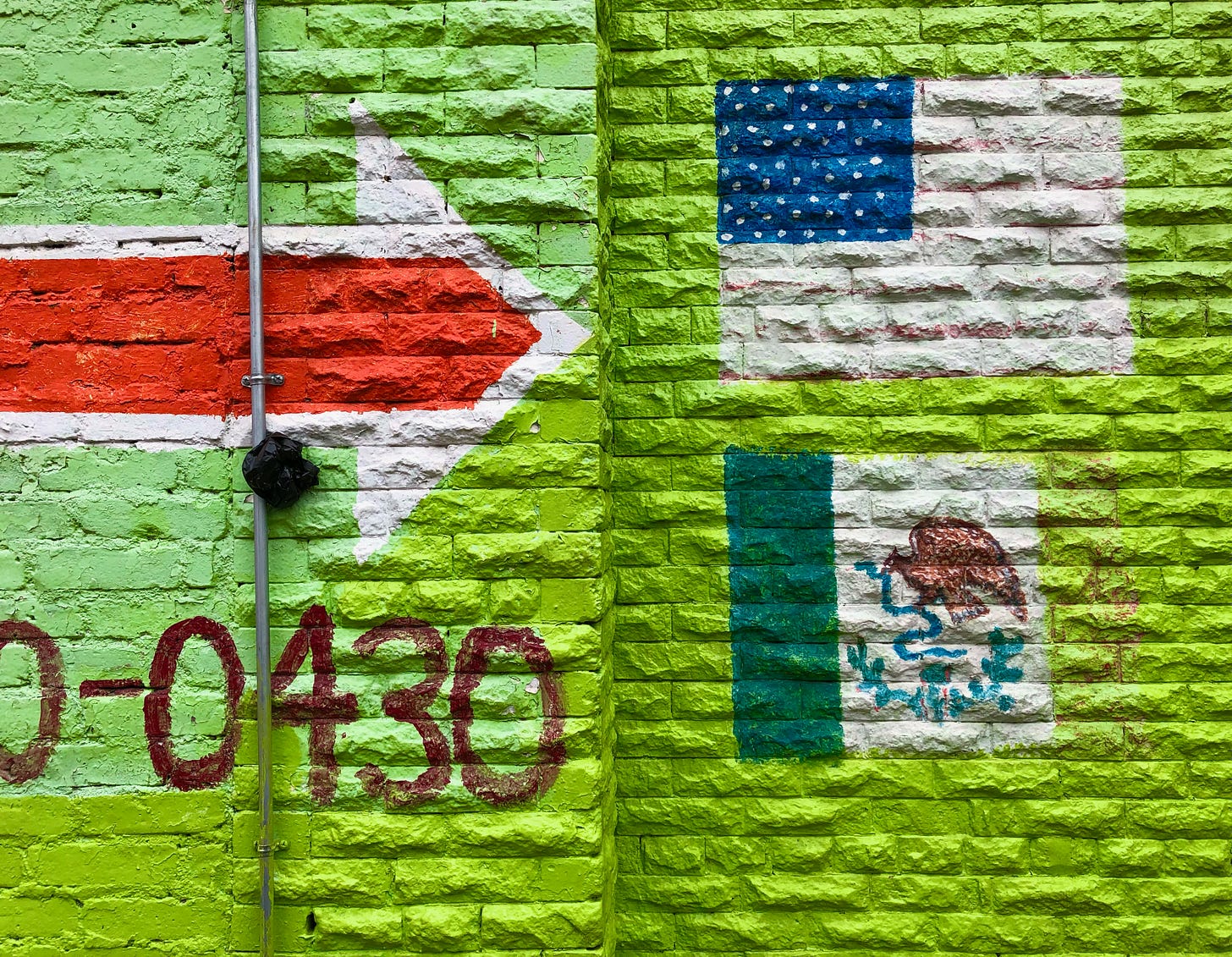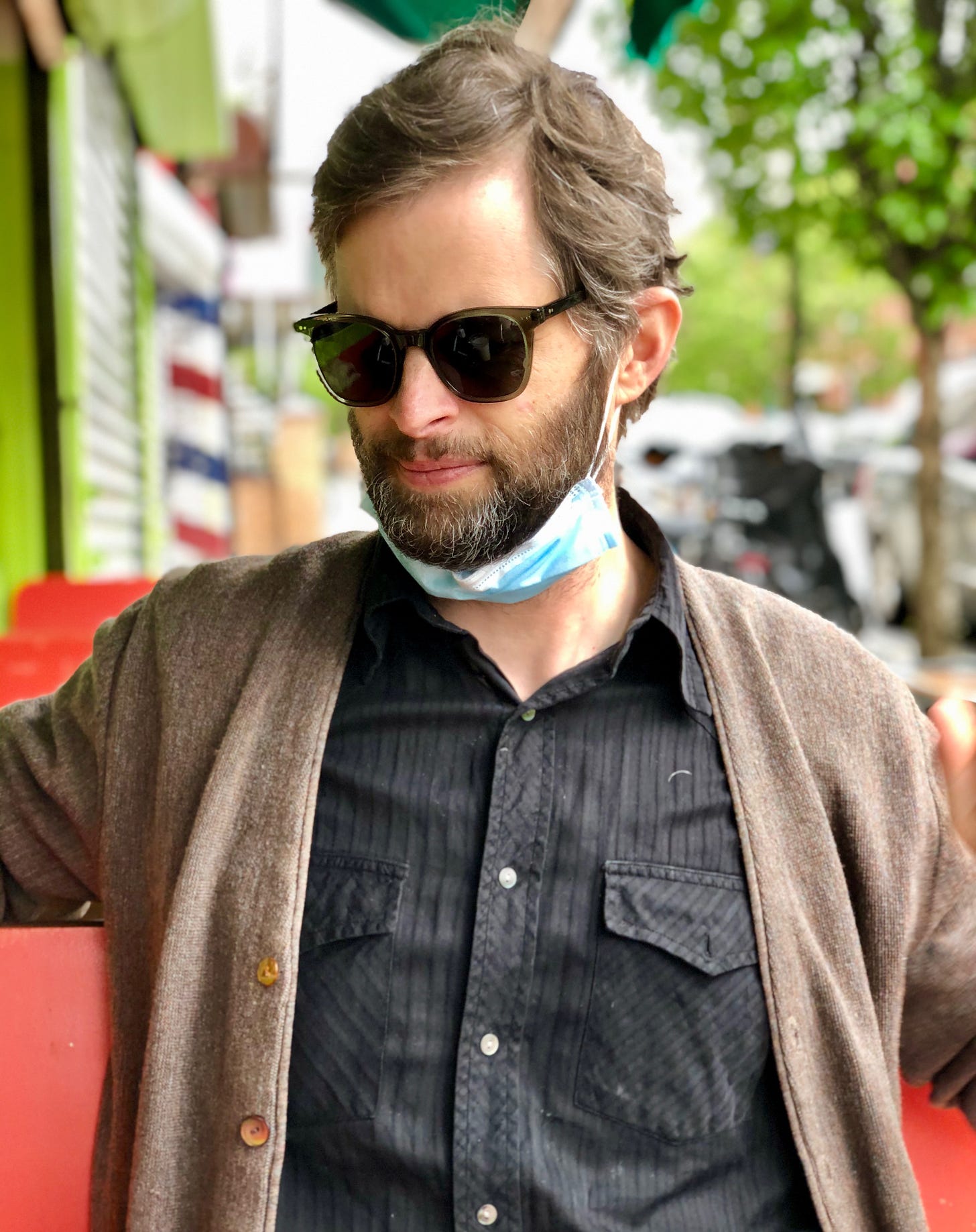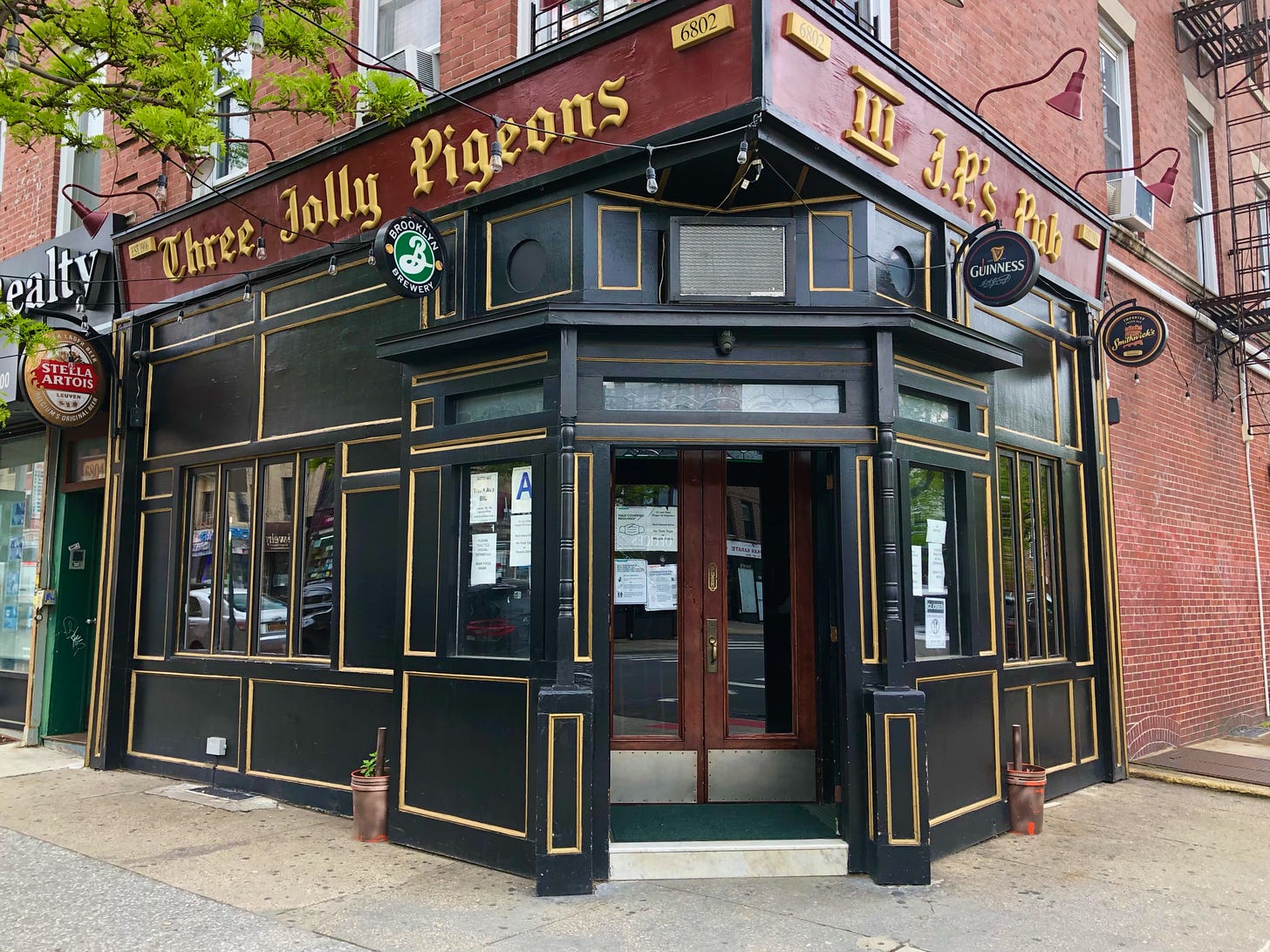A Bird-Filled Walk to the Three Jolly Pigeons in Bay Ridge With John Wray
"Living with other people has always comforted me more, and entertained me more, than it has annoyed me."
“You like bars, right?”
I’ve met John Wray outside of his brownstone, which is convenient as I live in his garden apartment. I was supposed to live here a year, a deal we made seven and a half years ago. John is very aware that I like bars.
Our walk today will be to the Three Jolly Pigeons, a pub in Bay Ridge that is one of the oldest continuously operating bars in all of Brooklyn, and thus all of New York. But first we have to get there.
As we pass Green-Wood Cemetery’s 25th Street entrance, John points out a giant nest that rests upon the large brownstone gate which looms large over one of the highest points in the entire borough. I’d never noticed it before.
“That’s a nest for Monk Parakeets. They’re an invasive species, from Argentina I think. Nobody’s totally sure how they ended up here. But they built a giant nest and a whole bunch of ‘em live together there on top of that spire.”
A self-described recovering birdwatcher, John will point out numerous feathered friends on our walk to a bar named after birds. A Canada Warbler. A Red-tailed Hawk. A Gray Catbird. But it is the Monk Parakeets that continue to capture my imagination. A bunch of birds who don’t belong there, living together atop a large brownstone structure. It reminds me of the home John has made for himself, and numerous others.
We make our way into Sunset Park, past bright and fragrant produce stands, and street venders trying to sell off an abundance of hand sanitizer. I am reminded of the Mission District, where I used to live in San Francisco. We stop at Rico’s Tacos for some incredible food—tortas, pozole, and large horchatas— before continuing through Sunset Park and on into Bay Ridge.
Isaac: You rent offices out of your house—fondly called Camp Cedar Pines—to writers and artists at... let’s call them reasonable rates. What is it that’s important to you about community? About having other writers and artists around you in your own living space?
John Wray: I’ve always been someone who liked living in group houses. When I was younger—in college and in my twenties—I always had these group living situations. So it’s what I’m used to. And living with other people has always comforted me more, and entertained me more, than it has annoyed me.
If I wanted to step outside myself and try my hand at some analysis, I was an only child—I have half-siblings, but never lived with them—and it’s probably something about having a chosen family. From the moment I left home there was an active effort to find my people. And even as I got older, I never saw a reason to abandon that model. I also love the idea that something truly worthwhile could be written, or drawn, or in some other way created in the house. That’s very exciting to me.
Space is at such a premium in New York City, which is why the city has been hemorrhaging artists for decades. So I was trying to recreate, in the house, a little scrap of the New York that I found when I first moved here—a city where you still had group houses, you still had squats, and you still had spaces so cheap that wild, totally unsustainable art galleries could exist for a few years before they disappeared. Or places where bands could practice and writers could write.
I: How much of your love of communal living do you think comes from your music background?
JW: Well, everything is communal in the band scene when you’re first starting out. I lived in band houses and—for a few years—I lived in my practice space. In a tent. In a neighborhood that’s now called DUMBO but was then considered a part of Vinegar Hill. That was a communal space in the purest sense, because there were four or five bands that used it—my own band being one of them—and everyone would come and go and practice and I was simply the person who happened to be living in the tent. We all chipped in on the rent, of course, but that was probably the closest I got to really pushing the amount of tolerance I had for constantly being around people. That said, I learned to play the drums during those years. Down there at various times there were members of Biohazard, Neutral Milk Hotel, Animal Collective, Cat Power, The Walkmen, The French Kicks, and… well, I know I’m forgetting a bunch.
There were a lot of shit bands too. Obviously, for every good band there were about twelve terrible bands, but at the time that didn’t really seem to matter.
I: Would you say coming up in the music scene or playing in bands influences your writing?
JW: I don’t think so. No.
But, the great thing about playing in a band when you’re a kid or in your twenties is that it’s probably—for most people—the first creative endeavor that anyone actually takes seriously. If you’re nineteen years old and you tell people that you’ve written a novel, people are going to pat you on the head. Same goes if you say you’re a filmmaker, or a poet, or a painter. People may be nice about it, but they’re going to condescend to you. But if you’re twenty years old and you’re in a hardcore band you might be at your absolute zenith. You might be at the point in your creative life where people are going to take you the most seriously.
And that’s important. Because that person may go on to do many different artistic things, but they had that initial experience of, “Oh! I can do something creatively and people will actually come to my shows and stand there and listen to it and at least appear to take it seriously. And maybe even like it.” There aren’t a lot of other art forms where you can be taken seriously when you’re young. In that way, being a part of a band was very motivating to me.
And that goes for people who were fans of those bands also. Or took photographs of those bands. Or wrote for fanzines. So many filmmakers start out simply filming punk rock shows or hardcore shows. Really, being a part of any kind of scene when you’re young can jumpstart a creative life, sometimes—or maybe even often—in a different art form.
I: You’ve been a musician, but you’ve also been a music journalist. You still write profiles of big bands and musicians. In your opinion, what makes a good profile?
JW: Avoiding all the bullshit that’s already been written about the person. Or, if you’re really lucky, you’re the first person to write a big profile of the band or musician, and then you have a lot of freedom. Although, in that case, you have to be careful that you’re not the person that originally perpetrates the bullshit.
The best advice I have is this. Think of it more as writing about people, and less as writing about a band. How do you lend reality to a band? If you can forget that the person, or the people in the band, are rockstars—and I’m not talking about the fame—if you can forget that the person in question is a musician and just think of your task as, “Here’s a freaky person I met at a bar the other day, let me tell you all about this weirdo.” That usually makes for a better profile.
You’re more likely to be successful in describing for the reader what kind of a person Nick Cave is, for example, then you are in explaining—or even figuring out for yourself—what makes Nick Cave interesting as an artist.
[Editor’s note: Although he didn’t mention it directly, Wray has profiled Nick Cave and it is a profile well worth reading.]
I: Switching gears away from rock and roll for a moment, you had a pandemic baby. You are a new father—
JW: I don’t even feel like a new father anymore, because this year feels like my child was born during the Renaissance or something. So many things have happened. It feels like 500 years. On the other hand, he was born right at the beginning of the pandemic. Most people talk about how time became abstract during COVID-19—“It was all a weird dream” and “Where did the time go?”—but my wife and I have a physical manifestation of a year in the form of a living organism that we have to keep alive.
I: The world’s most expensive hourglass.
JW: Exactly. It’s wild. We can see, “This is how much a year actually is in human.”
I: Are you discovering things about yourself as a father that you didn’t know? Or are you finding things out about human relationships?
JW: I’m not a big generalizer, so I don’t know if I can speak to all human relationships. But it is a relationship unlike any other. It has a lot in common with friendship, but really there’s some overlap with every profound and emotional connection you can have. Yet it is a different thing. It really feels like waking up in a country that resembles the country you have lived in your whole life, in almost every particular, but is nonetheless clearly a different country. Maybe even on a different continent.
It is very hard to describe exactly how, but it is effortlessly interesting. It’s like suddenly becoming roommates with the most interesting person you’ve ever met. Even though, to another person, he or she might not be that interesting. Like finding your soulmate, in a way. And that’s of course profoundly narcissistic, because the person has obviously sprung from you. So it’s kind of like saying, “I met the most interesting person in the world, and it’s the person in the world who’s most like me.”
But in another sense, an equally true sense, they’re not really much like you. At least as an infant. Certainly before they can speak. It doesn’t feel like you’re looking into a mirror, ever. Or at least not yet. It feels like you’re the first person to make contact with an alien race. So it couldn’t feel less like looking into a mirror, actually. But then over time that alien becomes more like you. And that also makes it interesting. Over time this alien becomes more and more recognizable to you as a fellow human.
I: Would you say being a father has affected your writing at all?
JW: Yes. Very profoundly. I don’t get any done.
I remember back when I used to play poker with a group of writers, Jonathan Lethem had recently had a kid. And he’s famously hyper-productive. So I asked him, “Do you still manage to get work done?” And he’s like, “Oh yeah, it just makes you really plan your day very precisely. You have X amount of time—you have 90 minutes in the morning to get work done—and it really changes you. You really take full advantage of those 90 minutes.”
And now I can only laugh bitterly. Maybe that was true for Jonathan, but that shit isn’t true for me. If I even have 90 minutes, the first 35 minutes are spent getting myself to a place where I can even think about what I might want to work on. And then the last 15 to 20 minutes are spent pressurizing my skull, getting ready to go back into the fray. So, what does that leave you with? 18 minutes of writing time?
That said, it’s also not forever. And that’s a bittersweet thing. Pretty soon he’ll be old enough to start going to daycare and I’ll be back to finding other ways to avoid working.
I: Speaking of work, I usually don’t ask, “What are you working on next?”—because everybody fucking hates that question—but I happen to have read the manuscript for your novel in progress, and I loved it. So what can you tell us about your next book?
JW: My new book is a tribute to all of the wild, doomed-seeming metal kids that I grew up around in the 80s and 90s. It’s about this group of three really close friends, who aren’t in any sort of metal band themselves, but come of age in the metal scene. The heyday of metal, when metal ruled the country, and possibly the world. Even though it was rarely talked about and rarely written about—which makes the project extra fun. How many books have been written about indie rock, or punk rock, or the ‘60s? I don’t personally know of any serious literature about metal. And in part that’s a class thing. Because metal was the music of working class kids.
I: It’s also about what we were talking about earlier. What it feels like to be part of a scene. For that scene to be taken seriously. And to grow up within a scene as that scene grows and changes. You have profiled metal bands and done nonfiction music writing. Is there nonfiction research that finds its way into this book?
JW: In a way, this novel started back in 2006 when I wrote my first profile ever, about a band called Sunn O))) [Editor’s note: pronounced “sun”] for the New York Times. To this day it's one of my favorite profiles, because of the ways the band members surprised me. The contradictions within them. As I went into writing that piece, having grown up in Buffalo, NY—a big metal town—I thought I pretty much knew whatever there was to know about metal. Then, after meeting that band, I started to realize that I had only a superficial knowledge of the genre. These guys were as interested in John Cage and Yoko Ono as they were in Black Sabbath. That’s when I first started wondering how I could go deeper.
I: Are you excited to go out and listen to music, now that the pandemic is slowing down and clubs are opening back up? Will you go to a show?
JW: There’s bound to be an unbelievable bonanza of bands that are simply chomping at the bit to get back out in front of an audience. So I’m sure there’ll be a ton of really great shows. As to whether I’ll go? I’ll say this. Any show by a band that I’m into, anywhere within three hours of the city, that happens to start at 2pm and finish well before 6pm—so I can be home to put my baby to bed—and I’m totally there.
By now we’ve arrived at the Three Jolly Pigeons, only to find it closed. Whether it simply hasn’t opened yet—despite being marked as open online—or it’s another victim of the pandemic, we can’t figure out.
John has to head to Penn Station, an out of town friend is coming to stay at his house and he wants to meet them in the city. Another Monk Parakeet come to live in his nest. He pops into a nearby subway station and makes his way to Manhattan.
I walk deeper into Bay Ridge, eventually finding a firefighter bar with outdoor seating where I stop for a drink. Which becomes two drinks. And then a bit of food. I have nowhere to be and it’s a long walk home.
When I make my way back past the Three Jolly Pigeons though, its doors are now wide open. I belly up to the bar, which feels comfortable. Familiar. As if sitting inside of a bar was something I’d done on the regular during the past year. There is a large wooden partition, ornamented with stained glass, splitting the barroom. Two old men talk about what movies they’re looking forward to seeing in the theater, while the bartender pours me a Guinness and tells me that the bar has been there since 1906.
“Oh, and the hours are 3pm to midnight, Monday through Wednesday. And noon to midnight, Thursday through Sunday.”
I give her a quizzical look.
“I saw you and your buddy peeking in the windows earlier.”
I laugh and ask about the partition.
“Supposedly they used it to separate men patrons and lady patrons back in the day. Although I don’t know how well it worked.”
This time we all laugh, the men at the end of the bar included.





